Switzerland, a jewel in the heart of Europe, is a country that consistently ranks high on travelers’ bucket lists. Renowned for its breathtaking alpine landscapes, delectable cuisine, charming historic towns, and cosmopolitan cities, Switzerland offers an unforgettable experience for every type of traveler. From snow-capped mountains perfect for skiing and snowboarding to serene lakes ideal for summer relaxation, Switzerland’s natural beauty is simply unparalleled.
Beyond its stunning scenery, Switzerland boasts a rich cultural heritage, delicious chocolate and cheese, and an incredibly efficient public transportation system. This welcoming nation prides itself on its neutrality, fostering an environment of peace, prosperity, and innovation. Whether you are an adventure seeker, a history buff, or a foodie, a trip to Switzerland promises to be rewarding.
This Switzerland Travel Guide aims to provide you with a comprehensive overview of the country, highlighting essential information to help you plan your perfect trip.
Your Comprehensive Switzerland Travel Guide:
- Best Time to Visit Switzerland
- Duration of Your Switzerland Trip
- Must-Visit Destinations in Switzerland
- A Glimpse into Swiss History
- Budget-Friendly Travel Tips for Switzerland
- Accommodation Options in Switzerland
- Exploring Switzerland with Worldpackers
- Indulging in Swiss Cuisine
- Getting Around Switzerland: Transportation Guide
- Top Things to Do in Switzerland
Let’s delve into the details and equip you with all the knowledge you need for an incredible journey to Switzerland. We’ll cover everything from practical travel advice to budget-saving strategies, and even explore unique experiences like Worldpackers work exchanges.
Why Switzerland Should Be Your Next Travel Destination
Switzerland’s allure is undeniable. Nestled in Central Europe, this safe and incredibly picturesque country caters to a diverse range of travel interests.
Adventure enthusiasts can find their thrill skiing down the majestic Alps or engaging in adrenaline-pumping activities in Interlaken. For those inclined towards art and history, Switzerland’s cities like Basel and Geneva are treasure troves of castles, museums, and art galleries.
The ease of navigation within Switzerland is another significant advantage. The country’s public transport is exceptionally well-organized and user-friendly, making it simple to explore. Furthermore, English is widely spoken, ensuring smooth communication and assistance whenever you need it. Getting lost or needing directions becomes far less daunting in Switzerland.
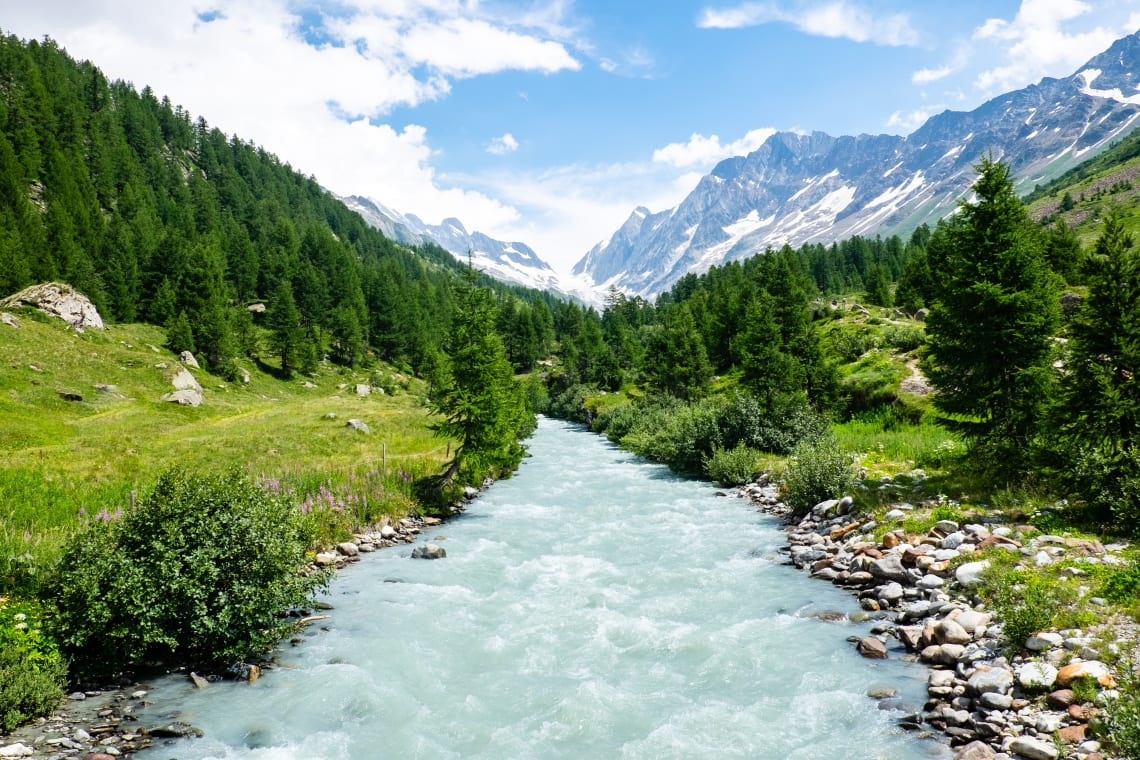 Explore the stunning landscapes and vibrant culture of Switzerland.
Explore the stunning landscapes and vibrant culture of Switzerland.
When is the Best Time to Visit Switzerland?
There truly is no wrong time to visit Switzerland. The ideal time depends entirely on your desired travel experience.
For winter sports enthusiasts, Switzerland transforms into a snowy paradise, perfect for skiing and snowboarding in the Alps. If a winter wonderland and snow-based activities are your priority, then winter is undoubtedly the best season for your visit.
The peak snow season runs from November to February. During this period, the Alps offer world-class skiing and snowboarding conditions, and the entire country is blanketed in picturesque winter scenery.
However, if you prefer outdoor pursuits like hiking, camping, canyoning, skydiving, mountain biking, or simply sightseeing in pleasant weather, summer in Switzerland is incredibly appealing.
Summer, from June to September, brings sunshine and warm temperatures. It’s an ideal time for exploring the Swiss landscapes. However, summer is also peak tourist season in Europe, meaning popular attractions can be crowded, and flight and accommodation prices tend to be higher.
For a balance of pleasant weather and fewer crowds, consider visiting during the shoulder seasons of spring (March to May) or autumn (September to November). During these months, you’ll often find more affordable prices for transportation, tours, and accommodation, while still enjoying comfortable weather conditions suitable for various activities.
So, when considering “the best month to visit Switzerland,” define your priorities. Are you dreaming of a ski holiday, a summer adventure, or a budget-conscious trip during the shoulder seasons? Your answer will determine the perfect timing for your Swiss adventure.
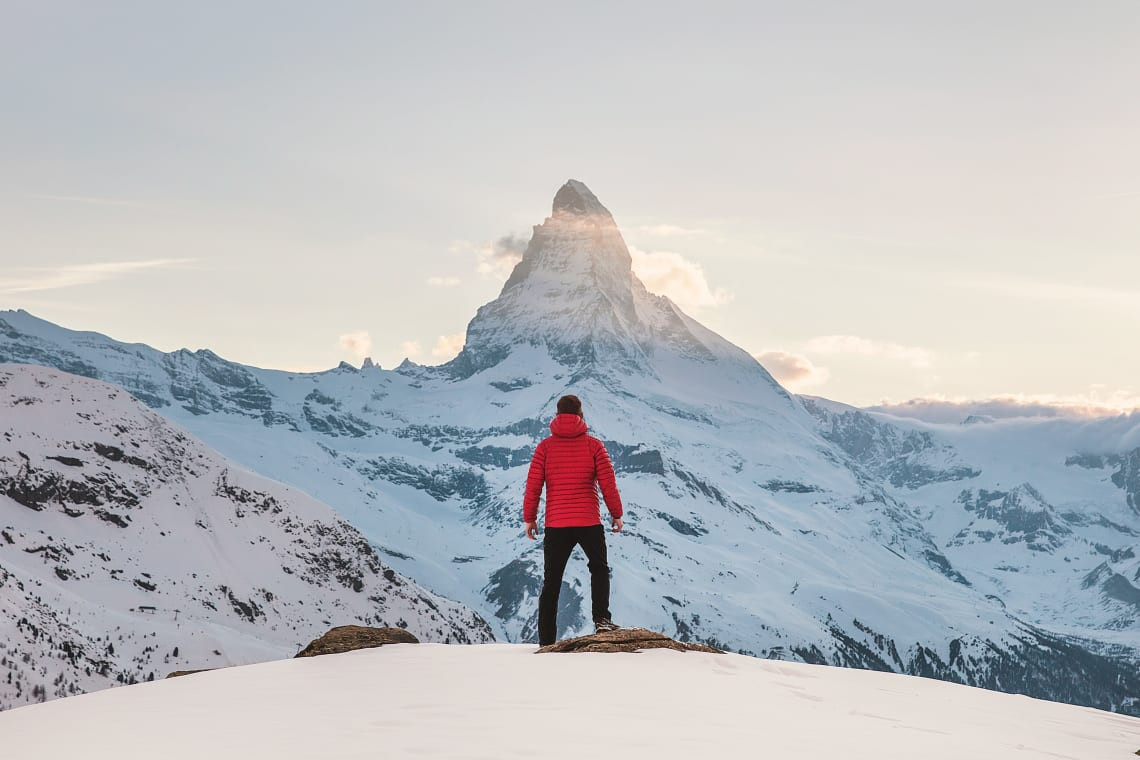 Switzerland's winter landscapes offer breathtaking views and world-class skiing.
Switzerland's winter landscapes offer breathtaking views and world-class skiing.
How Many Days are Sufficient for a Switzerland Trip?
While you could spend a lifetime exploring Switzerland and still discover new wonders, the ideal duration for your trip depends on your available time and travel goals. Generally, spending more time in Switzerland is always beneficial, especially given the abundance of natural beauty and activities.
For shorter trips of 3-5 days, it’s recommended to focus on exploring one or two key cities like Basel, Geneva, or Zurich. Immerse yourself in the city’s culture and consider a day trip to a nearby natural attraction or a charming local village.
A day trip to the Swiss Alps is an absolute must, regardless of your trip length. The Alps are arguably the most iconic and stunning region of Switzerland.
Interlaken is a highly recommended tourist town, perfectly situated as a base for exploring the Alps. From Interlaken, you can easily access skiing, snowboarding, hiking, biking, skydiving, and numerous other alpine adventures.
For those with more extended travel plans, consider a Worldpackers work exchange. This option allows you to exchange work for accommodation, enabling you to stretch your budget and immerse yourself in the Swiss culture for a longer period. If you have a month or more, you can truly experience the diverse landscapes and rich culture of Switzerland.
For a first-time visit to Switzerland, a 7-day trip is an excellent starting point. One week provides enough time to explore a couple of cities, experience the majestic Alps, and get a taste of what Switzerland has to offer, making it an ideal introduction to this captivating country.
Top Destinations: Where to Go in Switzerland
Switzerland is brimming with captivating destinations. Here’s a brief overview of some of the must-visit places to include in your Switzerland itinerary:
Basel: Located on the Rhine River in northern Switzerland, near the borders of France and Germany, Basel is often hailed as the cultural capital of Switzerland.
Geneva: A city steeped in history and diplomacy, Geneva is also blessed with natural beauty. Explore the serene Lake Geneva, discover one of Europe’s oldest Old Towns, and visit the headquarters of the United Nations.
The Matterhorn: This iconic peak in the Swiss Alps is a world-renowned symbol of Switzerland, attracting hikers and sightseers alike with its majestic presence.
Bern: The capital city of Switzerland, Bern, is a UNESCO World Heritage site, famous for its well-preserved medieval architecture, charming fountains, lush gardens, and unique landmarks.
Zurich: Switzerland’s largest city, Zurich, is a major transportation hub and a popular starting point for Swiss adventures. It’s a vibrant city known for its excellent shopping, numerous museums, and easy access to nearby villages and natural landscapes for day trips.
Switzerland National Park: A breathtaking protected area in eastern Switzerland, the National Park is a haven for nature lovers, offering exceptional hiking trails and cross-country skiing opportunities.
Interlaken: A renowned resort town nestled between the stunning turquoise lakes of Thun and Brienz, Interlaken is the adventure capital of Switzerland and the perfect base for exploring the Alps and enjoying outdoor activities.
Jungfraujoch: Known as the “Top of Europe,” Jungfraujoch is one of the highest railway stations in Europe and a premier destination for skiing and snowboarding in the Alps, offering unparalleled panoramic views.
Lucerne: A picturesque and historic town situated on the shores of Lake Lucerne, Lucerne is celebrated for its rich cultural scene, including music, art, museums, and its charming Old Town.
This is just a glimpse of the many incredible places to explore in Switzerland. Each destination offers unique experiences and contributes to the diverse tapestry of this remarkable country.
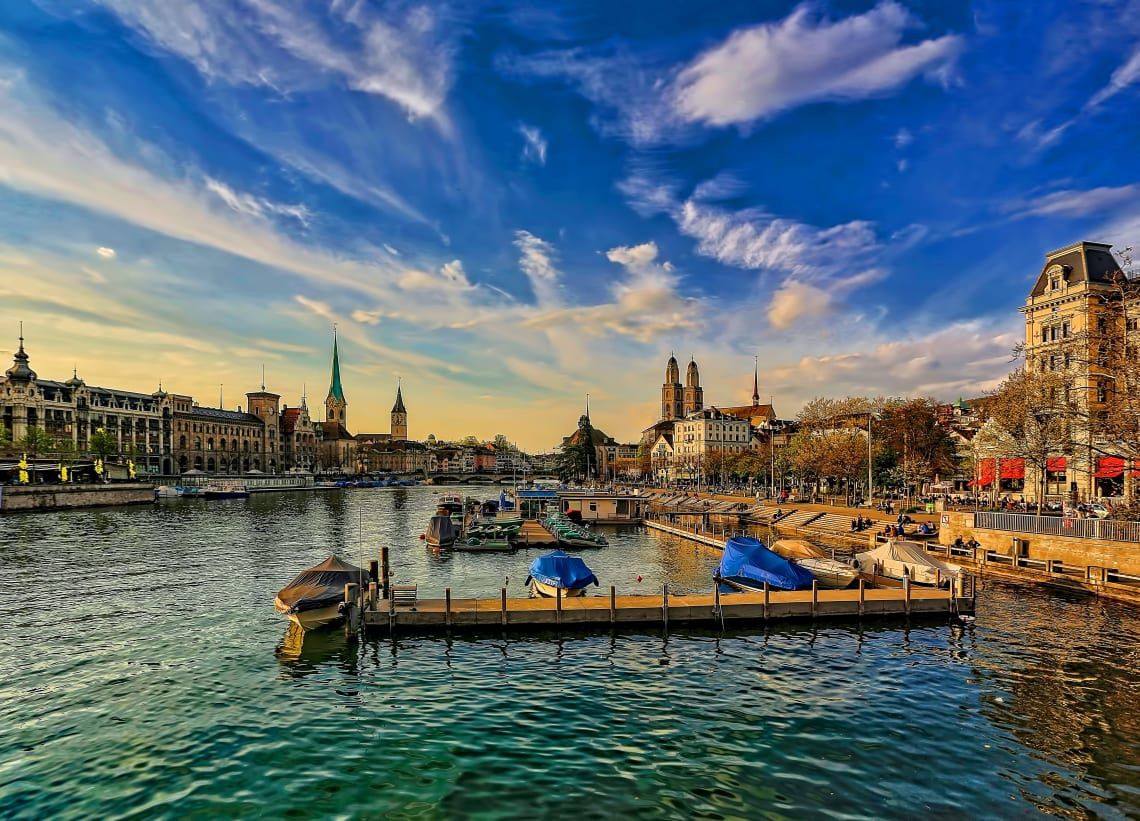 Explore the vibrant city of Zurich, a hub for culture and commerce in Switzerland.
Explore the vibrant city of Zurich, a hub for culture and commerce in Switzerland.
A Brief Journey Through Swiss History
Understanding a bit of Switzerland’s history enriches your travel experience, providing context to the country’s unique culture and identity.
The territory of modern-day Switzerland has been shaped by various empires and influences throughout history. It was once part of the lands inhabited by the Helvetians (Helvetic Celts), later came under the influence of Germanic tribes, and subsequently became a part of the Roman Empire.
Between the 13th and 16th centuries, the region gradually unified through alliances among ruling families, forming the Swiss Confederation. Remarkably, Switzerland maintained stability even during the turbulent period of the Protestant Reformation in the 16th century.
Strategically located at the crossroads of diverse European cultures, languages, and religions, Switzerland adopted a policy of neutrality, officially recognized with the Treaty of Westphalia in 1648. This neutrality became a cornerstone of Swiss identity.
Throughout centuries of conflict in Europe, Switzerland remained steadfast in its neutrality. In the 19th century, Switzerland established a Federal State, drawing inspiration from the US Constitution.
Even during the two World Wars of the 20th century, Switzerland maintained its neutral stance, remaining largely untouched by the widespread devastation, despite being surrounded by countries involved in the conflicts.
Switzerland experienced rapid development and industrialization in the 19th and 20th centuries. Today, Switzerland is recognized as one of Europe’s most advanced and prosperous nations. Swiss citizens enjoy a high quality of life, and Geneva hosts the European headquarters of the United Nations, reflecting Switzerland’s commitment to international cooperation and peace.
Switzerland’s historical emphasis on neutrality, peace, and prosperity is deeply intertwined with its appeal as a destination for travelers and residents alike.
Budgeting for Your Switzerland Adventure
Switzerland is known for being an expensive country to visit. However, traveling Switzerland on a budget is definitely achievable with careful planning and smart choices.
For those wondering, “How much does a trip to Switzerland cost?”, let’s break down some average expenses. Keep in mind that prices can fluctuate based on the season and current events. The figures below are general averages to guide your budget planning.
Prices are typically listed in CHF (Swiss Francs). The conversion rate between CHF and USD is approximately 1:1, making it easy to roughly equate CHF prices to US Dollar amounts.
Average Costs in Switzerland:
- Restaurant Meal: 10-15 CHF for lunch at a cafe, 20-30 CHF for dinner at a restaurant.
- Beer (Bar/Restaurant): 7 CHF.
- Ski Day Pass (Alps): 60-100 CHF.
- City Day Tour: 70-100 CHF.
- Museum Ticket: 20 CHF.
- Train Journey (Intercity): 20-50 CHF.
- Hostel Dorm Bed: 30 CHF per night.
- Budget Hotel Room: 80-100 CHF per night.
- Luxury Hotel Room: 200 CHF per night and upwards.
Based on these averages, here are estimated daily budgets for different travel styles:
- Backpacker Budget: 60-90 CHF per day.
- Mid-Range Traveler Budget: 150-180 CHF per day.
- Luxury Traveler Budget: 250 CHF per day or more.
Remember, these are just estimates. Your actual budget will depend on your individual spending habits, travel style, and priorities. Careful planning and awareness of these average costs will help you create a realistic budget for your Switzerland trip.
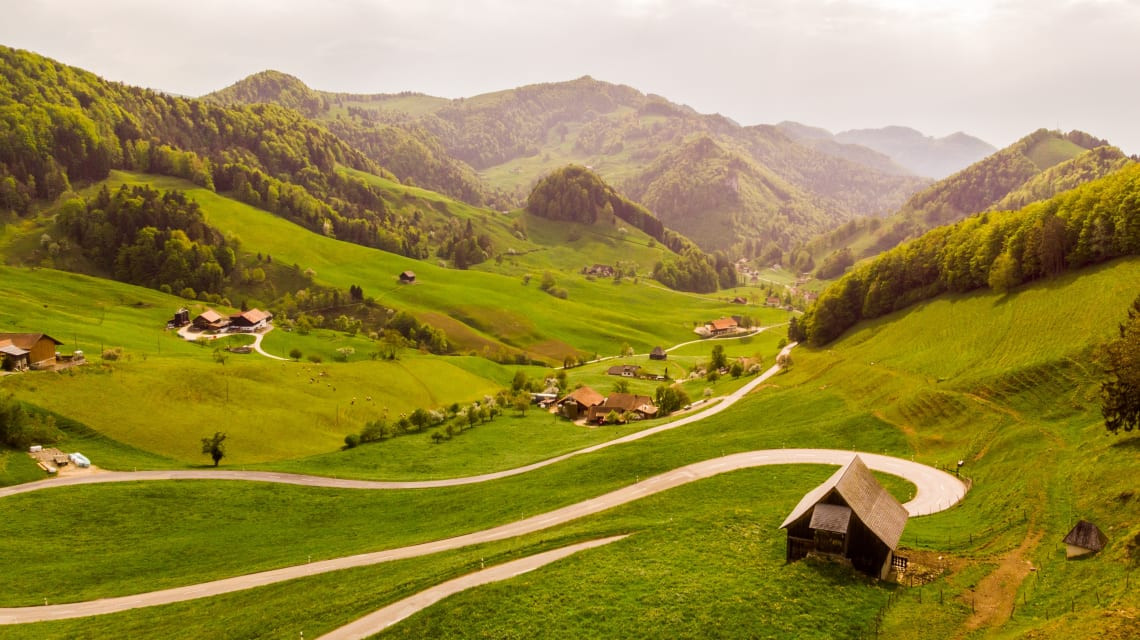 Budget-friendly travel in Switzerland is possible with smart planning and resourcefulness.
Budget-friendly travel in Switzerland is possible with smart planning and resourcefulness.
Accommodation Options in Switzerland
Switzerland offers a wide array of accommodation choices to suit every budget and travel preference.
For budget-conscious travelers, hostels are widely available, particularly in major cities like Geneva, Bern, and Zurich. Tourist hotspots like Interlaken and Lucerne also have numerous hostels.
Hostels are not only affordable but also excellent places to meet fellow travelers, especially for solo adventurers. Swiss hostels are generally modern, well-equipped, and secure, with amenities like lockers and helpful staff.
If your budget allows for more comfort and privacy, hotels are plentiful throughout Switzerland. You’ll also find numerous Airbnbs, Bed and Breakfasts, and Guesthouses offering a more personalized and intimate lodging experience.
For travelers seeking to minimize accommodation costs significantly, consider exploring work exchange opportunities.
Discover Switzerland Through Worldpackers Work Exchanges
Volunteering with Worldpackers is a fantastic way to experience Switzerland in a unique and budget-friendly manner.
By working in exchange for accommodation, you can dramatically reduce your travel expenses and extend your stay in Switzerland without paying for lodging! This is a significant advantage, especially given Switzerland’s reputation as an expensive destination.
Beyond the financial benefits, Worldpackers work exchanges provide opportunities to live and work alongside locals and fellow travelers. This immersive experience allows you to forge connections, learn new skills, and gain a deeper understanding of Swiss culture.
Here are a few examples of Worldpackers opportunities you might find in Switzerland:
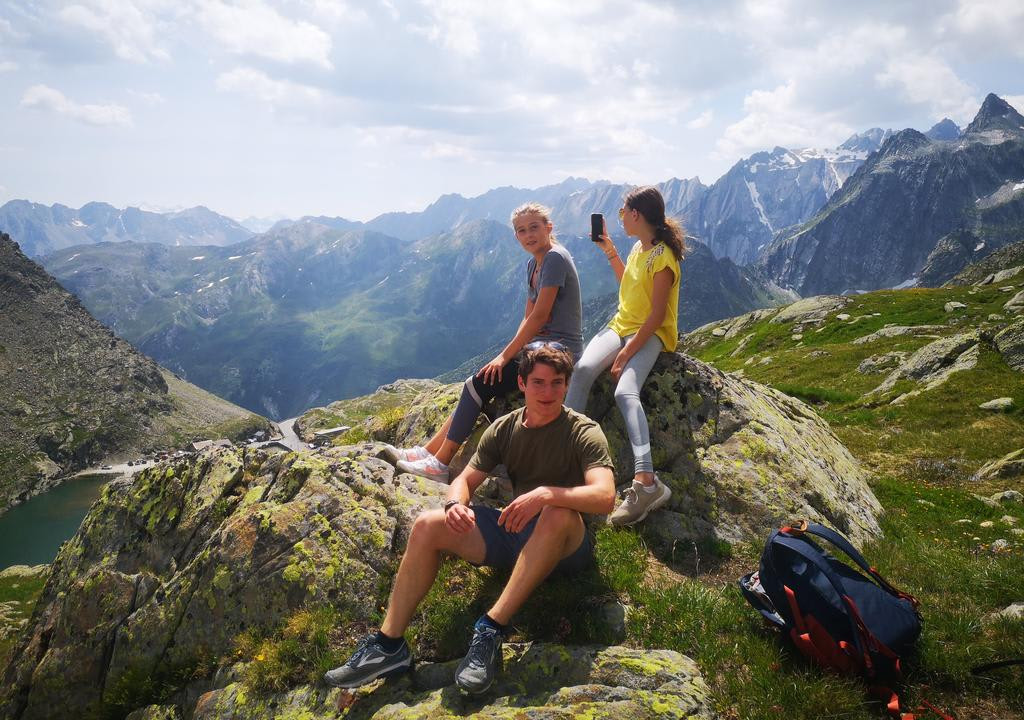 Create lasting memories and friendships through work exchange programs in the Swiss mountains.
Create lasting memories and friendships through work exchange programs in the Swiss mountains.
Must-Try Swiss Food and Drink
Swiss cuisine is hearty, comforting, and deeply rooted in local traditions. When visiting Switzerland, be sure to indulge in the country’s famous cheese and chocolate!
Swiss chocolate enjoys global acclaim, with renowned brands like Lindt and Toblerone. Characterized by a higher milk content than many other chocolates, Swiss chocolate is exceptionally rich, creamy, and decadent. Chocolate factories and boutiques are scattered throughout Switzerland, inviting you to savor this sweet delight.
Swiss cheese is another culinary highlight, a distinctive type of alpine cheese with a milder acidity and lower salt content compared to other cheeses. Popular varieties include Emmenthal and Gruyère. You can find Swiss cheeses in virtually every food store in Switzerland. Cheese is prepared and enjoyed in numerous ways, with fondue being perhaps the most iconic. Cheese fondue is an absolute must-try when you travel to Switzerland!
This communal dish features a pot of melted cheese, typically served with bread and vegetables for dipping. Restaurants across Switzerland specialize in traditional cheese fondue, offering an authentic and delicious Swiss culinary experience.
 Indulge in the rich and flavorful experience of traditional Swiss cheese fondue.
Indulge in the rich and flavorful experience of traditional Swiss cheese fondue.
Beyond chocolate and cheese, other Swiss culinary specialties to explore include:
- Papet Vaudois: A warming dish of stewed leeks and potatoes, typically served with sausage.
- Zopf Bread: A braided bread, often enjoyed with jams and fruits, particularly on Sundays.
- Tartiflette: A comforting baked dish featuring thinly sliced potatoes, bacon, onions, and Reblochon cheese.
- Leckerli: Sweet and spiced biscuits, often flavored with honey, almonds, and candied peel, originating from Basel.
- Älpermagronen: A hearty dish similar to macaroni and cheese, often enriched with potatoes, onions, and cream.
Getting Around Switzerland: Transportation Options
Navigating Switzerland is remarkably easy thanks to its efficient and extensive transportation network.
Public transport in Switzerland is excellent, with trains and buses connecting major cities and smaller towns effectively.
Flights to Switzerland from other European destinations are frequent and often affordable. Zurich and Geneva are major international travel hubs, along with Bern and Basel. Arriving in Switzerland by air is a convenient option.
While domestic flights within Switzerland are available, they can be expensive.
Given Switzerland’s relatively compact size, trains and buses are the preferred modes of transport for traveling between cities. For instance, a train journey from Geneva in western Switzerland to Zurich in the north takes only about 3 hours.
Trains are generally the fastest and most efficient way to travel between cities. Buses are a slightly slower and more economical alternative, particularly suitable for shorter distances and journeys to smaller towns.
Renting a car is another option, offering flexibility for exploring at your own pace. Swiss roads are well-maintained and easy to navigate. However, car rental tends to be more expensive than utilizing public transport.
Overall, Switzerland’s train and bus network provides excellent coverage and convenience for exploring the country.
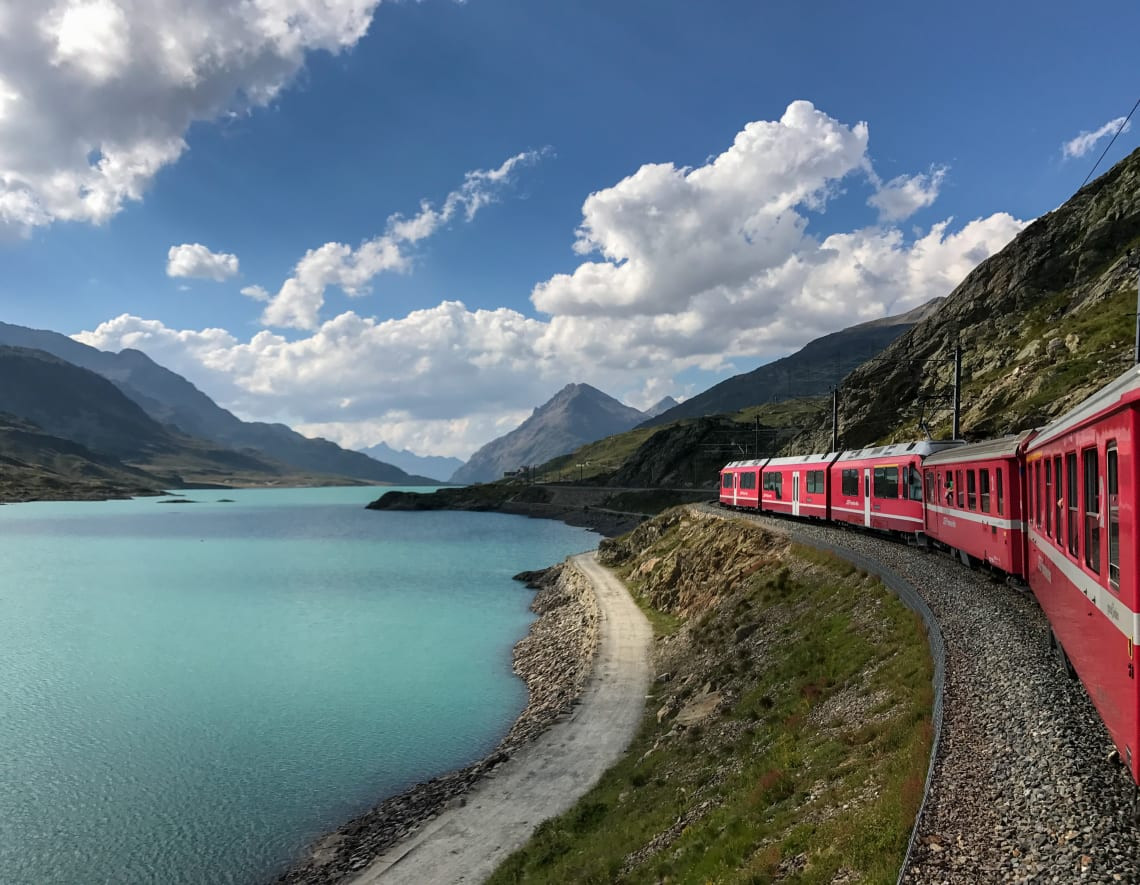 Experience breathtaking scenery on Switzerland's renowned train journeys.
Experience breathtaking scenery on Switzerland's renowned train journeys.
Top Things to Experience in Switzerland
Switzerland offers a plethora of activities and attractions. Here are some of the best things to do during your Switzerland trip:
Skiing and Snowboarding in the Swiss Alps
For winter sports enthusiasts, the Swiss Alps are a paradise. Jungfraujoch is a premier destination for skiing and snowboarding. Access the slopes by heading to Grindelwald and taking the train upwards.
Explore Geneva’s Charm
Geneva, a cosmopolitan city on the shores of Lake Geneva, is rich in culture and history. Discover fascinating museums, wander through the historic Old Town, and enjoy the stunning views along Lake Geneva’s shores. Consider a boat tour on Lake Geneva for enhanced sightseeing.
Visit the Majestic Chillon Castle
Nestled on the banks of Lake Geneva, Chillon Castle is one of Switzerland’s most impressive castles. Explore its extensive grounds and admire the picturesque lakeside setting.
Kayak on the Turquoise Lake Brienz
Adjacent to Interlaken lies Lake Brienz, famed for its stunning turquoise waters. Kayaking on Lake Brienz is an unforgettable experience.
Admire Oberhofen Castle’s Beauty
Situated on Lake Thun near Interlaken, the medieval Oberhofen Castle is a captivating sight and one of Switzerland’s most photographed landmarks.
Soak in Lucerne’s Scenic Views
Lucerne, a lakeside city, is renowned for its beauty and charm. Enjoy its art scene, museums, architecture, and picturesque lakefront promenades. If possible, attend the Lucerne Festival, a prestigious international classical music festival.
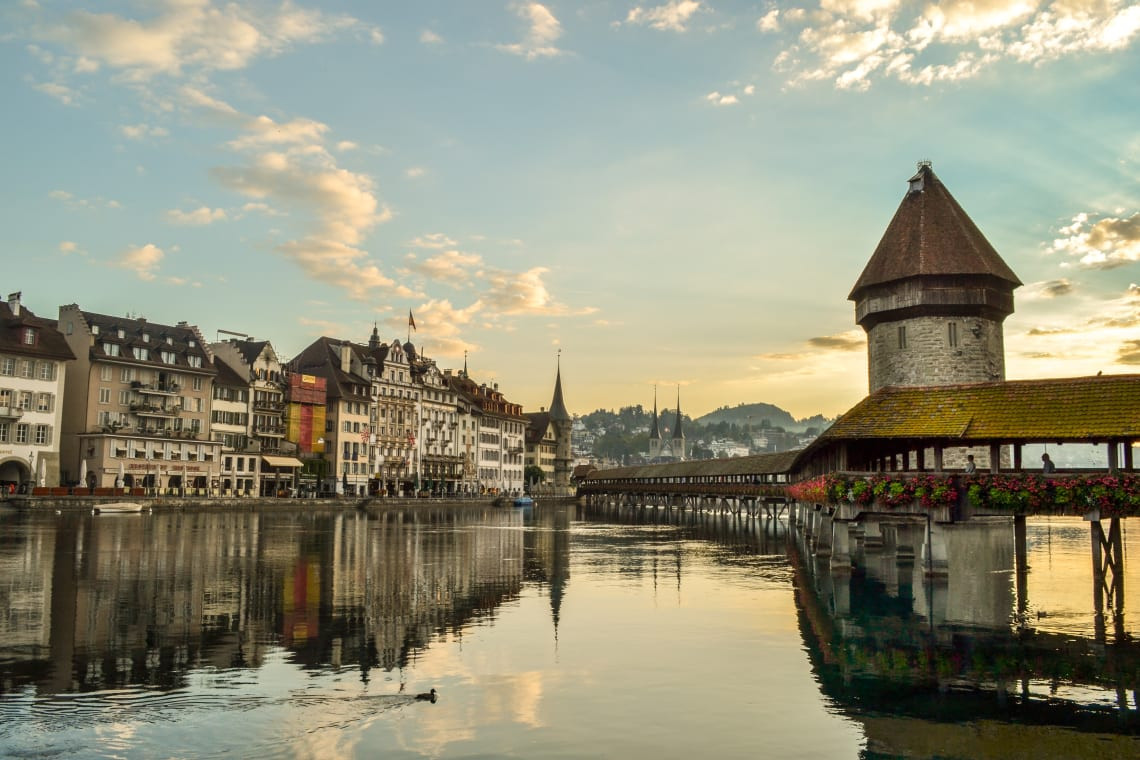 Lucerne's lakeside charm and historic architecture create a picturesque Swiss experience.
Lucerne's lakeside charm and historic architecture create a picturesque Swiss experience.
Indulge in Swiss Wine Tasting
Switzerland boasts excellent wineries scattered throughout the country, offering vineyard tours and wine tasting experiences. Explore renowned wine regions like Geneva, Vaud, The Three Lakes Wine Region, Valais, and Ticino.
Witness the Power of Rhine Falls
Rhine Falls, likely Switzerland’s most famous waterfall, is a natural spectacle. Visit the nearby town of Schaffhausen and walk to the falls, or take a boat tour for a closer encounter.
Hike up Mount Pilatus
Near Lucerne, Mount Pilatus offers hiking trails leading to incredible panoramic viewpoints overlooking the Alps. Alternatively, take a cable car to reach the summit.
Embark on Scenic Train Rides
Switzerland’s scenic train journeys are world-renowned. Experience breathtaking landscapes and countryside views on iconic routes like the Bernina Express and the Jungfrau Railway.
Hike to the Iconic Matterhorn
The Matterhorn, with its distinctive jagged peak, presents one of Europe’s most epic hiking challenges and rewards with stunning alpine vistas. Cable car access is also available.
Adventure Sports in Interlaken
Interlaken, known as Switzerland’s adventure capital, offers an array of adrenaline-pumping activities. Choose from bungee jumping, skydiving, canyoning, waterfall rappelling, whitewater rafting, paragliding, and more.
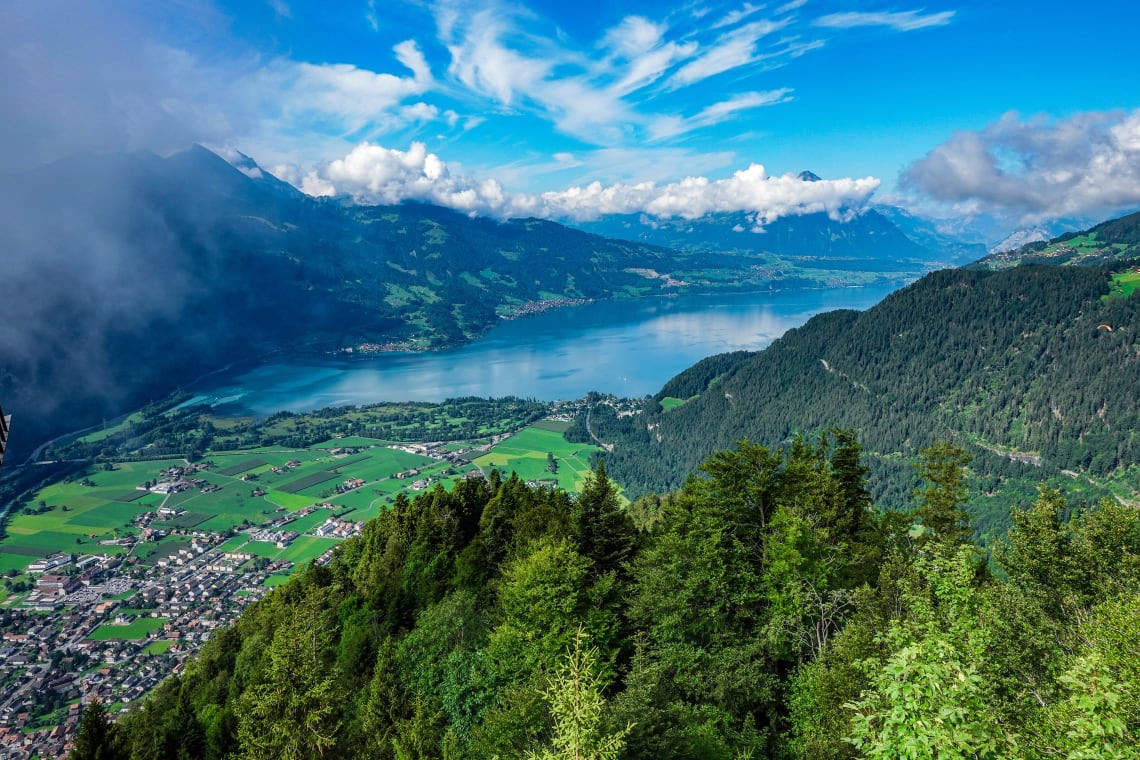 Interlaken: Switzerland's adventure capital, offering thrilling activities amidst stunning scenery.
Interlaken: Switzerland's adventure capital, offering thrilling activities amidst stunning scenery.
Concluding Your Switzerland Travel Guide
We hope this Switzerland travel guide has provided valuable insights and inspiration for planning your Swiss adventure.
Whether you are traveling on a shoestring budget or seeking a luxurious getaway, Switzerland’s captivating beauty, rich culture, and fascinating history offer something extraordinary for every traveler. Prepare to be enchanted by the Swiss Alps, charmed by its cities, and delighted by its unique experiences.
